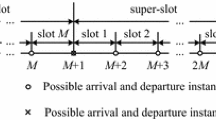Abstract
This paper investigates the performance of the primary user in a multiuser cognitive radio environment. Using spectrum sharing method, multiple cognitive users compete to share a channel dedicated to the primary user in order to transmit their data to a common receiver unit. Only one cognitive user is scheduled to share the channel, and to do so, its transmit power should not increase the primary user’s outage probability above a certain limit. The average bit error rate and the average channel capacity of the primary user are derived in this setup for different cognitive scheduling schemes. The performance measures of the primary user are found to depend on the cognitive user’s scheduling criterion and on the parameters of the communication environment.
Similar content being viewed by others
References
Ban T. W., Choi W., Jung B. C., Sung D. K. (2009) Multi-user diversity in a spectrum sharing system. IEEE Transactions on Wireless Communications 8(1): 102–106
Cover T. M., Thomas J. A. (1991) Elements of information theory (1st ed.). Wiley, New York
Goldsmith A. (2005) Wireless communications (1st ed.). Cambridge University Press, Cambridge
Hamdi, K., Zhang, W., & Letaief, K. B. (2007). Power control in cognitive radio systems based on spectrum sensing side information. In IEEE international conference on communications, ICC’07 (pp. 5161–5165).
Kang, X., Zhang, R., Liang, Y. C., & Garg, H. K. (2009). Optimal power allocation for cognitive radio under primary user’s outage loss constraint. In IEEE international conference on communications, ICC’09 (pp. 1–5).
Le, H. S. T., & Liang, Q. (2007). An efficient power control scheme for cognitive radios. In IEEE wireless communications and networking conference, WCNC’07 (pp. 2559–2563).
Li, D. (2010). Efficient power allocation for multiuser cognitive radio networks. Wireless Personal Communications—Published Online. http://dx.doi.org/10.1007/s11277-010-9926-6.
Li D. (2010) Performance analysis of uplink cognitive cellular networks with opportunistic scheduling. IEEE Communications Letters 14(9): 827–829
Miller S. L., Childers D. G. (2004) Probability and random processes: With applications to signal processing and communications (1st ed.). Elsevier Academic Press, Massachusetts
Papoulis A., Pillai S. U. (2002) Probability, random variables, and stochastic processes (4th ed.). McGraw-Hill, New York
Sklar B. (1988) Digital communications: Fundamentals and applications (1st ed.). Prentice Hall, Englewood Cliffs
Zhang, R., Cui, S., & Liang, Y. C. (2008). On ergodic sum capacity of fading cognitive multiple-access channel. In Forty-sixth annual allerton Conference (pp. 879–886).
Author information
Authors and Affiliations
Corresponding author
Rights and permissions
About this article
Cite this article
Farraj, A.K., Hammad, E.M. Performance of Primary Users in Spectrum Sharing Cognitive Radio Environment. Wireless Pers Commun 68, 575–585 (2013). https://doi.org/10.1007/s11277-011-0469-2
Published:
Issue Date:
DOI: https://doi.org/10.1007/s11277-011-0469-2




